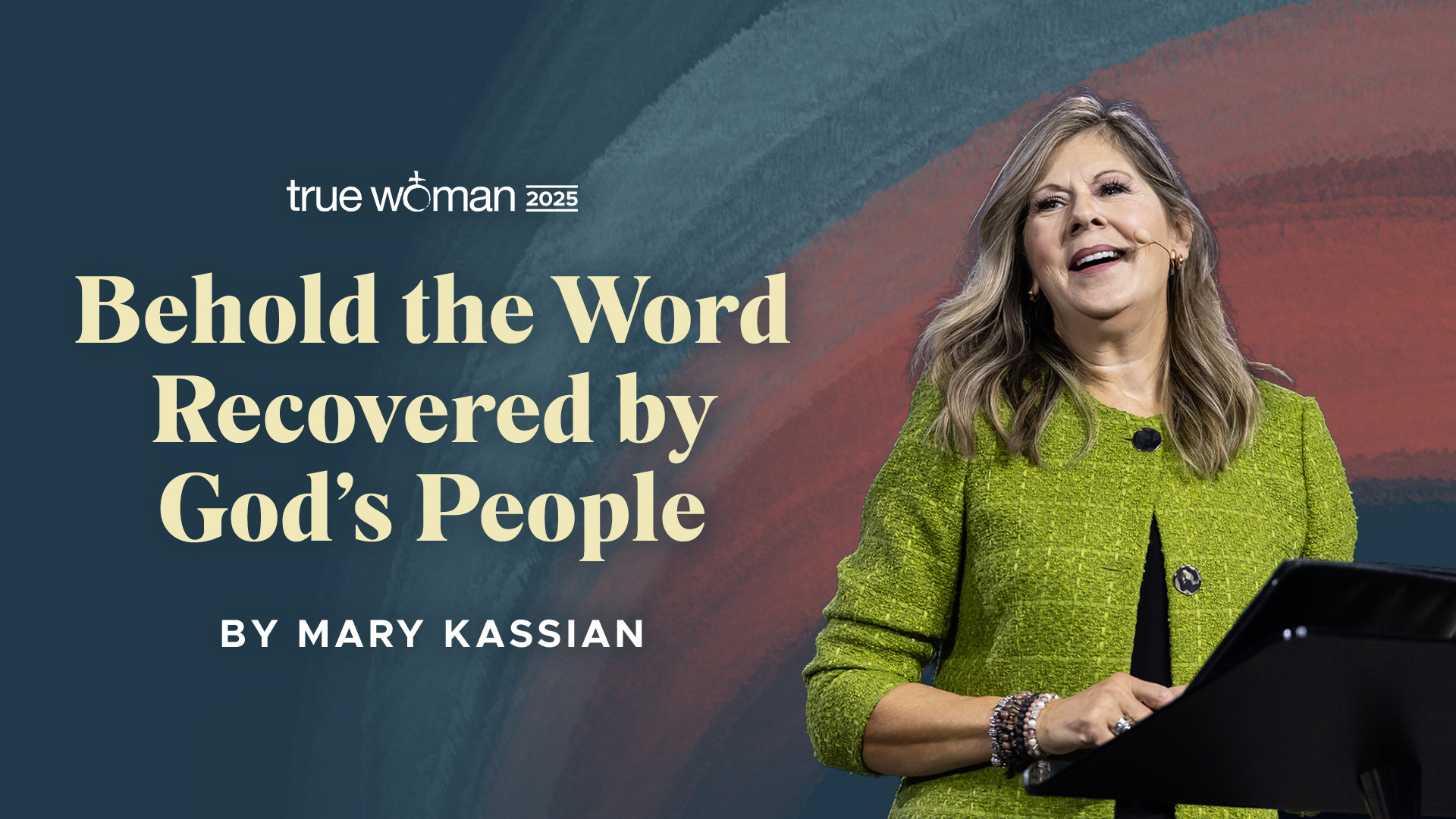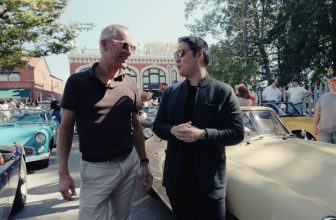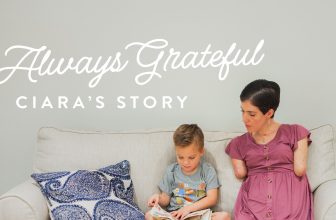
Dannah Gresh: What happens when we dust off our Bibles? Mary Kassian points us to the story of King Josiah for the answer.
Mary Kassian: The King stands and he reads the Word of God aloud. It was time to bring it out of the dusty corner and place it back center stage. Josiah led the entire nation in renewing their covenant with God. Then he launched one of the most sweeping religious reforms in the nation’s history.
Dannah: This is the Revive Our Hearts podcast with Nancy DeMoss Wolgemuth, author of Holiness: The Heart God Purifies, for November 10, 2025. I’m Dannah Gresh.
Nancy DeMoss Wolgemuth: One of our younger team members told me about a song that came out recently by a young singer/songwriter named Josiah Queen. It’s called “Dusty Bibles.” I just want to read you some of those lyrics from the chorus. He sings:
We’ve got dust on our Bibles, brand-new iPhones.
No wonder why we feel this way;
We walk with our eyes closed, blind leading blind folks.
And I’m done with those idols and dusty Bibles.
We do not want to be women with dusty Bibles. This young man is onto something. I also think his name—Josiah—is so fitting today. Last month at the True Woman conference, my good friend Mary Kassian gave a message about another Josiah, the King we read about in 2 Chronicles 34. He was the King who recovered God’s Word, who brought it back to the center of life in Judah. The result was powerful.
Mary is a longtime friend of Revive Our Hearts. In fact, she has spoken at every True Woman conference since the beginning in 2008. She’s written many books and Bible studies. She’s a speaker; she’s a wife; she’s a mom. She loves the Lord and is a faithful sister in ministry. So, here’s Mary with part one of her message from True Woman ’25.
Mary Kassian: In the early 1880s, Aaron and Rosie Winters eked out a hard scrabble living in Death Valley, California. Their shack was barely a shelter against the desert heat, and their meals often consisted of beans, and when times were lean, even lizards.
While foraging in the barren desert one day, as they did that regularly, they sometimes passed by an odd-shaped mound that was kind of white and looked like crusty cotton balls. They didn’t think much of it. But one day, recalling a prospector’s excited talk of a valuable mineral, they stopped, and they gathered a sample for testing, and the results astonished them. It was borax. That discovery changed everything. Aaron and Rosie left behind their shack and settled into a lush, sprawling ranch. They lived a comfortable life. They didn’t have to eat beans and creepy crawlies anymore.
Their find also ignited a booming industry. Soon the now legendary twenty-mule-team wagons were hauling tons of borax across the desert. Jobs sprang up. Communities were transformed. The economy of the region was transformed. And borax traveled far beyond the desert. Borax has found its way into almost everything: glass and ceramics and preservatives, detergents, cosmetics, from heavy industry to household chores. Its reach is surprisingly wide. And even today, you might have a box in your cupboard. Do you? I do. You might use it to brighten a load of laundry or scrub away stubborn stains or freshen up a carpet or for science projects with the kids as we did this past summer at cousin camp, when each grandchild got to grow their own borax crystal.
So just as Aaron and Rosie’s discovery reshaped their world, a Josiah moment, a fresh rediscovery of God’s truth can reshape ours and ripple outward to transform families and communities and even nations. And to see what I mean by a Josiah moment, please turn in your Bibles to 2 Chronicles chapter 34.
Now, let me provide some background to set the scene. Josiah was born around 648 BC in Jerusalem’s royal palace. His father, Amon, was heir to the throne. He was just sixteen years old when Josiah was born, but he was already immersed in the volatile world of royalty. Scripture portrays Amon starkly as proud, reckless, and self-absorbed, walking in the same evil ways as his father once had.
As a young prince, he was arrogant and indulgent and brutal and his appetite for blood and wine and women eclipsed any sense of the sacred weight of kingship that he was soon to bear. To little Josiah, Amon must have seemed both imposing and intimidating—a moody, unpredictable teenager with little time or inclination for the duties of fatherhood.
In the quieter corners of the palace, another presence loomed. Josiah’s grandfather, Manasseh, once a proud tyrant, now bent beneath a crushing weight of age and remorse. Now, because he was the king’s first grandson and second in line to the throne, Josiah may have spent long hours at the old man’s side listening as confessions spilled out, raw and unguarded.
Perhaps Manasseh spoke with terrifying honesty about his youthful arrogance and his drunken indulgence and the rivers of blood he had spilled and the idolatries he had imposed on the nation—fortune telling, omens, sorcery and dealings with mediums and necromancers. Now, his voice would have cracked with self-reproach for these sins.
Perhaps Manasseh told Josiah of his shocking humiliation, dragged away on meat hooks by a foreign ruler, paraded, bloody, and naked before the crowds, stripped of all dignity and power.
Josiah may have traced the bumpy scars on his grandpa’s belly, feeling both awe and fear as the old king’s voice shook with emotion.
Though he had sought to repent, Manasseh sadly lamented it was far too late to undo all the evil he had done as king. But the most haunting words may have come through tears as Manasseh admitted offering Josiah’s uncle, his own infant son, as a burnt sacrifice to Malik.
The memory haunted him still, a legacy of blood and evil no time or repentance could erase. His trembling hand may have rested on Josiah’s shoulder, urging with the anguished insistence of an aged broken man, “Cling to Yahweh. Guard your heart. Don’t repeat my mistakes!”
Josiah’s mother, Jedidah, also shaped the young boy. Raised in rural Judah and devout to Yahweh, she whispered prayers over her son, sang him hymns at dawn, told stories of the great King David, whose heart for God was forged in the hills as hers were.
At six, Josiah lost his grandfather and the throne passed to his twenty-two year-old father. But just two years later, his world was upended with a violent chaotic event. His father was assassinated, and eight-year-old Josiah became king. That’s where 2 Chronicles 34 picks up the story. I’m not gonna read the entire chapter, but I’ll guide you through it, highlighting some key verses along the way. So let’s start at verse 1.
Josiah was eight years old when he became king and he reigned thirty-one years in Jerusalem. He did what was right in the LORD‘s sight and walked in the ways of his ancestor David; he did not turn aside to the right or the left. In the eighth year of his reign, while he was still a youth, Josiah began to seek the God of his ancestor David, and in the twelfth year he began to cleanse Judah and Jerusalem of the high places, the Asherah poles, the carved images, and the cast images.
Then in his presence, the altars of the Baals were torn down, and he chopped down the shrines that were above them. He shattered the Asherah poles, the carved images, the cast images, crushed them to dust and scattered them over the graves of those who had sacrificed to them. He burned the bones of the priests on their altars. So he cleansed Judah and Jerusalem. He did the same in the cities of Manasseh, Ephraim, and Simeon and as far as Naphtali and on the surrounding mountain shrines. He tore down the altars, he smashed the Asherah poles and the carved images to powder. He chopped down all the shrines throughout the land of Israel and returned to Jerusalem.
In the eighteenth year of his reign, in order to cleanse the land and the temple, Josiah sent Shaphan, son of Azaliah, along with Maaseiah, the governor of the city and the court historian Joah, son of Joahaz, to repair the temple of the LORD, his God. (vv. 1–8)
Okay, so let me recap. At age sixteen, Josiah makes a personal commitment to follow the Lord. At twenty, he launches a campaign to cleanse Judah and Jerusalem of idolatry, even pressing into the former territories of Israel. And his mission was much more than political. He wasn’t merely tearing down idols. He was calling a fractured nation back to its covenant with the Lord. Reform moved slowly. The opposition was fierce. The temple, long neglected, was dilapidated. There was so much that remained undone. Josiah knew that few would enthusiastically engage in worship while God’s house stood in such repair.
So when he was twenty-six, he redirected the temple funds. The silver and the offerings that were long misused and plundered, he directed those towards a massive restoration project . . . and then it happened . . . the discovery that changed everything. The moment—the Josiah moment.
As the workers carried out the repairs, Hilkiah the priest uncovered something staggering. You see it in verse 14. Verse 14 records it. Hidden among the temple treasures lay a scroll, “the book of the law of the Lord written by the hand of Moses.”
Now what began as a routine restoration suddenly became a moment that would shake the kingdom to its core. The law long forgotten within God’s house had been found. The stage was set, a new chapter in Israel’s history and in Josiah’s life was about to unfold.
Now remarkably, this may have been the only, the original, and only surviving copy of Moses’ books. Some scholars say it was just the book of Deuteronomy. Jewish scholars say it was all five books of the Pentateuch. The other copies had likely been destroyed or lost during the early reign of Manasseh when worship of the Lord was nearly eradicated.
So for sixty years, two full generations, the Jews had gone without the public reading or teaching of God’s law. God’s Word was left to gather dust, forgotten in a neglected corner of the temple. Imagine that, the Word lost for sixty years. And all the while, propped up by history and tradition and ritual, the people thought that they could live godly lives without it.
The scroll was right there in the temple, yet even the priests were blind to its presence. They busied themselves with religious activity and service to God while they walked right past the Word of God. The irony is staggering. We might feel incredulous reading this story, but how often does the same thing happen to us?
The Word gets lost. It sits on a shelf unopened or by the door so we can carry it like a prop on Sundays. We attend services, we join small groups, we volunteer, we sing on the worship team, we help in the nursery, we serve in the soup kitchen, but the Word of God is not really at the center. We busy ourselves with spiritual activity while neglecting the very Word that gives it life.
Moving the Word from the corner to the center, that’s what ignites a Josiah moment.
Now, the court secretary brought the lost scroll to the palace and read it aloud before Josiah. Its words laid bare the depth of the nation’s sin, their neglect of the covenant, and the severity of the judgment that awaited them. And how did Josiah respond? Verse 19:
When the king heard the words of the law, he tore his clothes.
Now, in biblical times, tearing one’s clothes was a symbolic act of grief and horror and repentance. It was emotions too overwhelming for words alone. In that instant, Josiah was struck with the full reality of Judah’s rebellion. The living Word of God pierced his heart and it left him utterly undone.
His response stands in marked contrast to that of his successor, King Jehoiakim. Rather than humbling himself, Jehoiakim cut a prophetic scroll up with his knife, piece by piece he tossed it into the fire, and then he angrily ordered that the prophet be apprehended and executed (see Jer. 36).
He didn’t like the Word of God, but not Josiah. Determined to respond rightly, Josiah humbly sought guidance, sending a delegation to the prophetess Huldah, to understand the consequences of the nation’s sin. Her prophecy carried a dual message. Judgment was coming on Judah because the nation had forsaken God and embraced idols. Disaster was inevitable. Yet because of his tender and humble heart, mercy would be shown to Josiah, sparing him from witnessing it and allowing him to die in peace.
Now, the rediscovery of God’s Word ignited something powerful in Josiah’s spirit. And with renewed resolve, he committed himself to lead Judah in wholehearted, covenant faithfulness to the God revealed in the scroll. Let’s pick up the story in verse 29.
So the king sent messengers and gathered all the elders of Judah and Jerusalem. The king went up to the LORD‘s temple with all the men of Judah and the inhabitants of Jerusalem, as well as the priests and the Levites—all the people from the oldest to the youngest. He read in their hearing all the words of the book of the covenant that had been found in the LORD‘s temple.
And then the king stood at his post and made a covenant in the LORD‘s presence to follow the LORD and to keep his commands, his decrees, and all his statues with all his heart, and with all his soul in order to carry out the words of the covenant written in this book. He had all those present in Jerusalem and Benjamin agree to it. So all the inhabitants of Jerusalem carried out the covenant of God, the God of their ancestors.
So Josiah removed everything that was detestable from all the lands belonging to the Israelites. And he required all who were present in Israel to serve the LORD their God. Throughout his reign they did not turn aside from following the LORD, the God of their ancestors. (vv. 29–33)
So the prophecy, Huldah’s prophecy, propelled Josiah into decisive action. He got everyone together, the leaders, the officials, every citizen in the region, and then in a powerful public moment, the king stands and he reads the Word of God aloud. He wanted everyone, great and small, young and old, to hear God’s law. It was time to pull it out of the dusty corner and place it back center stage.
And with courage fueled by fresh conviction, Josiah led the entire nation in renewing their covenant with God. And then he launched one of the most sweeping, religious reforms in the nation’s history.
Second Kings chapter 23 gives us a striking detail. He stripped the temple of every idol, altar, and trace of pagan worship. He dismissed court priests, the ones that were corrupt. He burned the Asherah pole that was right there in the temple. He demolished the quarters of the shrine prostitutes that lived on the temple grounds. He dismantled the altars where children had been offered to Molech. He smashed statues, burned sun chariots, outlawed mediums and psychics and astrologers and fortune tellers. He ordered the people to cleanse their homes of idols. He restored the celebration of the Passover, and he led the nation back to wholehearted, exclusive worship of Yahweh, their God. And it was all because Josiah rediscovered the Word.
Second Kings 23, verse 25 declares:
Before him there was no king like him who turned to the LORD with all his heart, all his soul and all his strength according to all the law of Moses, and no one like him arose after him.
Wow! That’s amazing.
Now, his story illustrates how a rediscovery or a re-engagement with God’s Word, moving it from corner to center, can ignite a powerful chain reaction.
- First comes conviction, a deep awareness of truth and the reality of sin.
- And this conviction fuels courage, the bold action to do what is right even in the face of opposition.
- And when conviction and courage take hold, they generate contagion, a ripple effect that transforms not only individuals, but families and communities.
Conviction, courage, contagion, those are the three hallmarks of a Josiah moment.
Now the dictionary defines conviction as “a firmly held belief or an opinion.” It’s a strong persuasion or a certainty about something. Everybody has convictions, beliefs that shape how they see the world. Just tune into the news, switch from CNN to FOX, you’ll see that there are lots of people who have opinions, and they express them with passion and certainty.
But conviction, Al Mohler reminds us, is not merely beliefs we hold, it’s those beliefs that hold us in their grip, shape our decisions, and govern our lives. Conviction is a lens through which we interpret truth, right and wrong, and the purpose of our lives.
Now, Josiah had inherited a rich spiritual legacy, but at sixteen he made his own. He decided consciously to follow the Lord.
Under Manasseh and Amon, Judah had absorbed the gods and the practices of Assyria and Canaan and worship had become a whole jumble of Yahweh and foreign idols. But Josiah held two convictions that ran counter to his culture. First, he believed there was only one true God. Verse 3 says he began “to seek the God of his father David.” One God alone deserved his allegiance.
The second conviction was that God alone defines right and wrong. Verse 2 tells us “he did what was right in the LORD‘s sight and he did not turn aside to the right or to the left. Morality to him wasn’t a matter of personal preference or public opinion. It’s not a question of my truth. Truth is anchored in God’s law.
But at this point, his convictions were largely untested, and the scroll of God lay forgotten in the corner. His commitment was real, but he hadn’t yet encountered the words that would forge those convictions into something living and unshakable. And then came the moment. The scroll was rediscovered, read aloud, and he was confronted with the Word of God. Is this what you truly believe, Josiah?
Now believing in God as a vague religious notion is easy, but confronting the full weight of the Word of God, the full weight of Scripture, seeing your sin and embracing the cost of following Jesus, that’s something else entirely.
So what are your convictions? What beliefs hold you in their grip? A conviction uninformed by Scripture will be weak, watered down, or woefully wrong.
Nancy: Amen. What a powerful word from Mary Kassian. Those are some important questions for each of us to ask ourselves. What are your convictions? What beliefs hold you in their grip?
At True Woman ’25, we spent the weekend beholding the Wonder of God’s Word together, because what we desire is that our convictions—that your convictions—would be formed and fashioned by the truth. If God has used Revive Our Hearts to point you to Scripture, if He’s used it to help you find freedom, fullness, and fruitfulness in Christ. If so, would you consider partnering with us through a financial gift?
This month, when you make a donation of any amount, we’d love to send you the brand-new Revive Our Hearts ministry calendar for 2026. It’s filled with Scripture verses, beautiful illustrations, as well as quotes from my book, A Place of Quiet Rest. It also contains a daily Bible reading plan so you can track with women from all over the world who are setting out to read the whole Bible together in 2026.
To give and request your Revive Our Hearts wall calendar, visit ReviveOurHearts.com, or call us at 1-800-569-5959. As you look at this calendar each day, I hope you’ll be reminded of the precious truths of God’s Word.
Well, tomorrow we’ll hear the rest of Mary Kassian’s message from True Woman ’25. It’s a powerful, convicting, and timely message for our day. Please be back for Revive Our Hearts.
This program is a listener-supported production of Revive Our Hearts in Niles, Michigan, calling women to freedom, fullness, and fruitfulness in Christ.
All Scripture is taken from the CSB.
*Offers available only during the broadcast of the podcast season.






